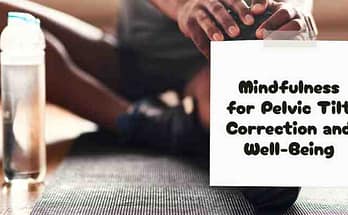Posture is a term used in the context of physical health, but it can also be used to describe your mental state as well. The way we hold ourselves affects our emotional and mental well-being, and there are many ways to improve both. In this article, we’re going to talk about how posture does affect your mind and how you can adjust your posture for better overall health and happiness.
Why body awareness is the key to unlocking your mental stress.
The body and mind are intimately connected. You may have heard that the body is a reflection of the mind, but there’s more truth to that saying than you might realize.
In fact, the body and mind can affect each other—and it’s essential for your mental well-being to pay attention to how you carry yourself physically.
Physical and mental well-being are affected by what goes on in your body. For example, if you suffer from chronic pain or discomfort, this can contribute to stress and anxiety over time; this often leads to tense muscles that further exacerbate pain levels by keeping them in a state of tension.
Body awareness is essential for both physical wellness and mental health because it allows us to identify what might be causing our bodies difficulties at any given time so we can address those issues directly instead of letting them snowball into something worse.
When the body is tense, the mind feels it.
When you hold tension in the body, the mind feels it.
This topic is for you if you’re interested in how your body can impact your state of mind. The connection between the physical and mental is something we’re always learning about through science and research. But what does that mean for our everyday lives? What does it mean for how we treat ourselves?
The relationship between these two parts of ourselves is important because our bodies are often caught up in stress responses that limit us from performing optimally. When the body is tense or stressed out, so is our ability to think clearly and effectively—and vice versa: when we are mentally taxed by negative thoughts or energy (such as anger or frustration), it becomes challenging to stay calm physically as well.
Stress has a direct effect on our bodies because humans were built with an innate response system that triggers fight-or-flight mechanisms when faced with danger. When those responses become chronic due to daily life stressors, however—like sitting at a desk all day long—they can manifest themselves physically over time into things like headaches and back pain due to poor posture or digestive problems like acid reflux disease which result from eating too quickly due to anxiety around deadlines/deadlines being missed; even less apparent symptoms like dry eyes may indicate underlying tension levels!
Posture is the way we sit, the way we stand, and the way we move.
According to the Merriam-Webster dictionary, posture is defined as “the position of the body when standing or sitting.” Although we may think of posture in terms of how it looks, there’s more than just an aesthetic element to it. Posture is also related to health, emotional, and even mental state.
When you want to change your physical body by improving your posture (or any other aspect of yourself), you will quickly learn that these changes can often be difficult because they require effort and persistence over time. However, for this effort and perseverance to pay off in results, it’s important to understand what true success looks like.
For example: if we’re trying to correct our posture by straightening up those slouching shoulders but haven’t addressed any other parts of ourselves (such as our feelings), which might have caused us not only slouching but also feel bad about ourselves in the first place—then we might find ourselves right back where we started after making all those improvements!
The idea that posture can affect mental health is nothing new.
Many studies have shown that posture is directly related to how we feel. We all know that when we feel tense and stressed, our shoulders tend to rise toward our ears, and our chest caves in, but did you know this physical tension can affect your mental state? The idea that posture can affect mental health is nothing new—it’s been studied for decades with growing interest.
Research suggests that the benefits of a positive physical stance go beyond just having better posture; it also shows that people who stand tall are more confident, less anxious, and have greater self-esteem than those who slouch. When we stand up straight against gravity (the natural pull of Earth), it puts our body into a position where it doesn’t need to expend energy on keeping itself upright—it becomes easier for us to move around because there isn’t as much resistance from gravity pulling us downward toward the ground.
When we go against nature (by slouching), it requires more effort from muscles throughout the body. It thus causes increased stress in those areas of the body which would otherwise not be activated by simply standing normally!
How we carry ourselves affects our health.
A good posture is not only about looking fashionable and confident. It has a lot to do with our health and mental abilities. In this article, we will discuss how our physical body affects our mind and how we can use that knowledge to improve our lives
- Posture affects your emotions
Here’s an example: If you have bad posture, you’ll likely look depressed. How come? Because your mind sees this as a sign of weakness and tries to protect itself from any possible harm by putting up emotional walls around itself (defensive attitude). And these walls make us feel isolated from others – which makes us frustrated with them and so on!
- Posture affects your health.
A study conducted by researchers at Harvard University showed that people who hold their heads high tend to be healthier than those who don’t. They have fewer aches and pains, live longer, and are more energetic.
How your posture affects your emotions
Your posture affects how you feel. In a University of California study, participants were asked to remain upright for two minutes. After the time elapsed, their brains were scanned for changes in their emotional state. The results showed that people standing up straight had significantly fewer negative emotions than those slumped over or slouching on their chairs.
The short phrase “posture counts” is true for more than just our physical bodies; it also applies to our mental health. When we carry ourselves in an open and confident manner—even if we’re not feeling particularly proud of ourselves at the moment—it’s reflected outwardly and inwardly by our attitude toward ourselves and others around us.
A person with good posture takes ownership over what they say and do because they believe they deserve credit when things go right (and take responsibility when necessary). Good posture also makes us feel more powerful because it allows us to project greater confidence than someone slumped over with shoulders hunched forward would be able to achieve without effort!
The importance of self-care for managing emotional pain
Self-care is one of the essential strategies for managing emotional pain. Self-care can help you feel better, but it also enables you to cope with what’s going on in your life. Because when you are focused on taking care of yourself gives you a sense of control over what happens in your life rather than feeling powerless or overwhelmed by whatever is going on.
Self-care has many different forms. Some examples include:
- Taking a bath or shower
- Taking some time out during the day to read a book
- Going for a walk outside
- Do something nice for someone else
This tension creates a feedback loop that can be difficult to escape from and can contribute to a feeling of overall malaise.
The body is an extension of the mind. So when you experience stress, it manifests physically in all kinds of ways: your skin may become flushed, your muscles tense, and your heart rate increase.
You can also use this link between body and mind to manage anxiety or depression by practicing mindfulness techniques like yoga or meditation. These practices help you develop an awareness of how your body feels—and ultimately how you feel inside—which means that when things start to go wrong (as they so often do), you’ll have the tools necessary to intervene before things get too out-of-hand.
There are many ways in which our posture affects our mental health. From a simple physical posture to a more complex emotional one, the link between body and mind is undeniable. By paying attention to how we hold ourselves and how this affects our mental state, we can gain control over our emotions even when they feel uncontrollable. It is especially true for people with chronic pain or other conditions that affect their bodies daily but may not be easily treated through traditional medicine (or even self-care).




